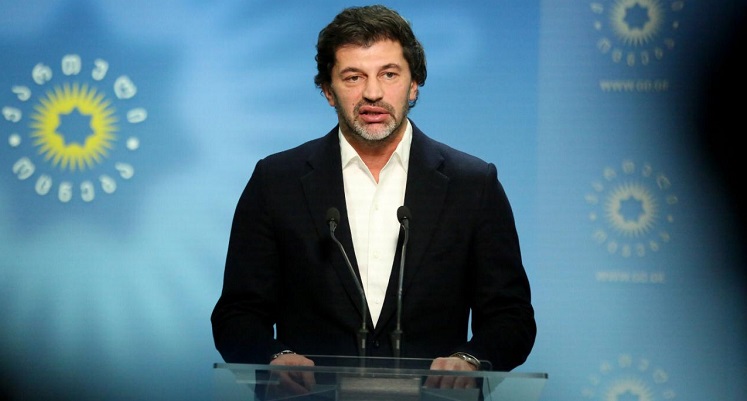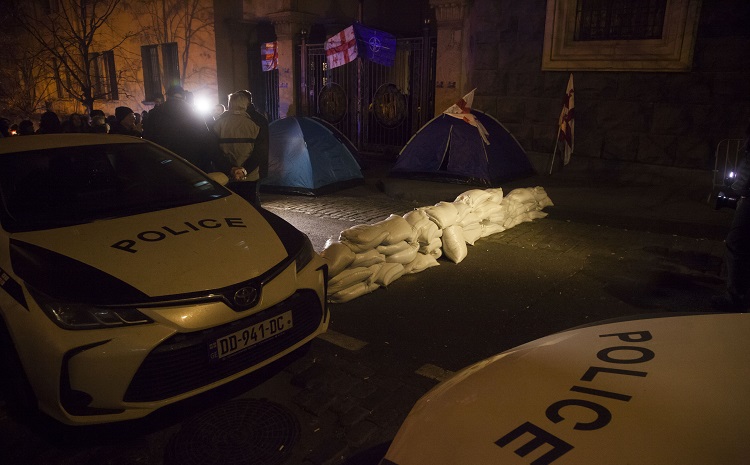Ruling party refuses to meet protesters' demands of fully proportional vote in 2020

The Georgian Dream ruling party says that the United National Movement opposition wishes to create unrest in the country and stands behind the current rallies. Photo: Georgian Dream press office.
The ruling Georgian Dream (GD) party has refused to discuss any new initiatives regarding the electoral system, responding to the protests in Tbilisi demanding a fully proportional electoral system from 2020.
Secretary General of the ruling party, Tbilisi Mayor Kakha Kaladze has stated after a party meeting earlier today that the 2020 parliamentary elections will be held with a mixed-electoral system, as parliament rejected the ruling party proposed bill on the move to the fully proportional elections last Thursday.
Kaladze said that Georgia will move to a fully proportional election system from 2024, as the current constitution reads.
The 2020 race will be conducted in line with the state constitution, top democratic standards and with the involvement of the international community,” Kaladze said.
He has urged his opponents to get prepared for the election and “do not blame an electoral system for their failure in a situation when they have no public support.”
Kaladze said that the “real organiser” of the rallies, which kicked off in Tbilisi after the rejection of the bill last week, “is the United National Movement (UNM) opposition party with its branches, and their motivation is to stir unrest.”
 Rustaveli Avenue remains blocked by demonstrators. Photo: Nino Alavidze/Agenda.ge.
Rustaveli Avenue remains blocked by demonstrators. Photo: Nino Alavidze/Agenda.ge.
He stated that for many years the UNM ran the country with a constitutional majority in parliament [at least 113 MPs in the 150-member parliament] and “had never thought to change the mixed electoral system.”
Moreover, the change of the electoral system was not even discussed in 2010 when the UNM carried out a constitutional reform. The issue has not been raised by those opposition parties as well who are now present at the rallies,” Kaladze said.
Kaladze also mentioned former Parliament Speaker David Usupashvili [who chaired the body under the Georgian Dream leadership between 2012 and 2016], “who headed the State Constitutional Commission and did nothing for the move to the fully proportional elections.”
Kaladze said that the Georgian Dream was the “only political force” in the country who initiated the move to the fully proportional electoral system and adopted appropriate changes in 2017 which offered the move to the fully proportional voting starting from 2024.
The changes were adopted alongside the protest and boycott of the opposition parties who are now on the streets. Thanks to the consensus inside the ruling party [as the majoritarian MPs of the ruling party were against the fully proportional elections] the amendments were carried out,” Kaladze said.
He stated that if the opposition did not boycott the process back in 2017, Georgia would have moved to a fully proportional electoral system starting 2020 and not 2024.
All electoral systems have their pros and cons. However, both electoral systems we have in the country are legitimate and democratic. The 2020 race will be conducted with a mixed electoral system, as has been done over the past three decades. Public trust wins elections not electoral systems,” Kaladze said.
Kaladze says that the UNM has“zero public trust and no chance to win the elections with any electoral system.”
He stated that the "position expressed by our main international partners on the current developments is especially appreciated in this process."
 Kaladze said that the Georgian government will act as it should to ensure peace and safety. Photo: Nino Alavidze/Agenda.ge.
Kaladze said that the Georgian government will act as it should to ensure peace and safety. Photo: Nino Alavidze/Agenda.ge.
That is why they are trying to come back to power with the help of unrest,” Kaladze said.
What was the situation and system like in the past?
The ruling party accepted the conduct of 2020 parliamentary elections on a fully proportional system amid the June public protests in Tbilisi, as it was one of the three demands of demonstrators to stop rallies.
The ruling party proposed bill on holding 2020 parliamentary elections per a fully proportional voting system and a zero per cent entry threshold was scrapped last week as only 101 MPs voted for it instead of mandatory 113 in the 150-member parliament [where the GD has less than 100 MPs].
Vice Parliament Speaker of Georgia Tamar Chugoshvili, and 11 fellow MPs have left the Georgian Dream ruling party after the rejection of the bill, while demonstrators and the opposition blocked Rustaveli Avenue in protest.
- Georgia has had a mixed electoral system with 77 seats in its 150-member parliament allocated proportionally under the party-list among parties or electoral blocs which cleared a five per cent threshold in the race.
- The remaining 73 MPs were elected in 73 single-member districts, known as “majoritarian” mandates. A majoritarian MP candidate has to gain more than 50 per cent of votes to take a seat in the legislative body.
- The new constitution of Georgia, which was adopted in 2017, and which came into play after last year’s presidential elections, reads that Georgia would move to fully proportional elections from 2024.
- The opposition and the civil sector say that the majoritarian electoral system fails to ensure fair distribution of votes.
 Tweet
Tweet  Share
Share